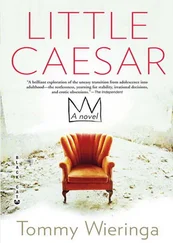‘Arthur,’ Joe said.
‘That’s right, you don’t know, how could you? Arthur Metz, the writer. He’s my significant other. Or I should say, my boyfriend; Arthur hates euphemisms.’
‘Euphemisms.’
‘Arthur Metz,’ she repeated. ‘Never heard of him? This is his latest novel.’
She pushed a book into Joe’s hands. My Gentle Demise was the title. P.J. stood at the counter making coffee, she looked over her shoulder at Joe.
‘He’s a poet too.’
Infatuated pride radiated off of her. On the back cover of the book was a photo of a handsome man with premature wrinkles on his forehead, bags under his eyes.
‘I’m always at his place at night, during the day he needs to be alone. He can’t write with anyone else around. After ten o’clock he wants to see me again. Arthur needs that solitude, he’s very sensitive. Anything that disturbs his rhythm upsets him terribly. When I’m ten minutes late he starts asking where I’ve been.’
‘Wow,’ Joe said.
‘I’d love to introduce you, but he can’t handle new people. It scares him. Sometimes it makes him aggressive, you never know. He finds it very difficult to be touched, sometimes he shrivels all up when I touch him.’
‘Is he, uh. .’
‘Oh, Arthur is as psychotic as they get. He’s tried to commit suicide three times. But the things he’s taught me! It’s amazing, the things he teaches me! With him it’s totally different from anything I’ve ever known, I’d never thought that existed, you know what I mean? It’s hard to explain.’
‘Even better than Jopie Koeksnijder?’
At that P.J. laughed so hard that the coffee splashed over the sides of the mugs.
‘And what about here, Frankie? Anything happen around here?’ Joe asked when his story was finished.
I frowned. I couldn’t come up with anything worth telling. It had been quiet without him, without Engel and Papa Africa, even without Christof. Almost everyone I knew had left, and the ones still around didn’t interest me. Quincy Hansen had stayed, of course; I wouldn’t be shot of him as long as I lived. He was working at Bethlehem Asphalt, doing minor administrative work. What a waste of all those years of valuable learning.
I was still pressing briquettes myself, although production had taken a dip since the rains had set in.
‘Really, nothing?’ Joe asked.
I shook my head and wrote: Papa Africa?
‘Shit situation. Anything’s possible. Theoretically, he may even have sailed back to Egypt, but. .’
Joe’s expression reflected the incredible hardships of such a journey.
‘It’s possible, though,’ he said. ‘Stranger things have happened. What do you think, would he have tried that? I mean, you two got along.’
Difficult .
‘Difficult, but not impossible! I looked at the map; he could have gone right out to sea. Along the New Waterway to the North Sea, through the Straits of Dover. If he stuck close to shore, then along the coast of France toward the Atlantic, the Bay of Biscay, northern Spain, I mean, why not?’
He dug into the tobacco and pulled out a honey-coloured wisp. I scratched my chin and tried to imagine the route, but Europe’s outer boundaries were fairly vague in my mind.
‘Imagine it, all the way past Portugal to Gibraltar, it’s possible! If Thor Heyerdahl could cross the Atlantic on a papyrus raft, why not Papa Africa in a felucca all the way to Egypt? He was a good sailor, that’s for sure, and if you had a little luck with the weather, why not?’
I nodded, despite all my petty objections.
‘Think of all the things he must have seen once he was past Gibraltar. . Algiers, Tripoli, Tobruk, and then you turn right past Alexandria and sail straight into Egypt. I could see him doing that, really.’
Joe needed that faith, it was as hard for him to accept the loss of his stepfather as it was for his mother. But where she submerged herself in gray mourning, he created the heroics of an odyssey. He had thought the whole thing through, he seemed capable to me of making the journey himself just to prove that it could be done. And preposterous or not, it cheered me up, the possibility of a happy ending. If Joe thought it was possible, who was I to say it wasn’t? He was the can-do man. But if Papa Africa truly had tried to sail back, there was one thing Joe hadn’t mentioned.
Why? I wrote.
‘You remember her hiding his passport?’ he asked.
I nodded.
‘There were other things, too,’ Joe said. ‘One incident I remember was after Ramadan, right before Christmas last year. Maybe it had nothing to do with it, I don’t know, but I’ve never forgotten it in any case. You know Papa Africa never ate pork, he seriously thought it would kill him, or at least give him hives. Things like that were haram . He had lots of things like that; if India had been his daughter, for example, he would have had her circumcised. Or he believed that the left hand belonged to the Devil, so you should never eat with it, because that was haram too. They used to argue about things like that, or at least my mother did, he never argued back. He was too calm for that, you remember how he was. “She has a hot head,” he would say, and leave it at that. The day before Christmas, though, my mother made lamb meatballs for dinner. The next day, on Christmas Day, she asked him how he was feeling. Fine, he said, why did she ask? You don’t feel sick or anything, she asked, no different than usual? He shook his head no, everything was fine. Then she hit him with it: “Because yesterday you ate pork . Not lamb, pork. You see, it doesn’t give you hives! Allah didn’t punish you!” And she went on like that, while we just sat there stunned.’
Joe licked the gummed edge on the final cigarette and wormed it into the mustard jar along with the others.
‘I mean, go figure. India was furious with her, but he didn’t say a word. Talk about a fucked-up Christmas.’
That Joe had come back to Lomark to stay was something I realized only in late November, when he found a job as a hod carrier. Every weekday morning at six he would be freezing his butt down off at the dyke, where the van came by to pick him up along with a couple of other guys. They took the back roads into Germany, where they worked on the construction of new apartment complexes and industrial estates. Illegal cross-border labour was nothing new, it had existed for centuries on both sides. Through a complex network of contractors and subcontractors, construction workers were funnelled through to Germany, where no taxes or social premiums had to be paid for them. They received their wages by the week and it was their tough luck if they fell from a scaffolding or if a U-beam landed on their foot. Joe had seen a man who had gone into a coma after being hit on the head by a concrete element that was swinging from a crane. His buddy went to the office to complain, but they told him it was the man’s own fault, ‘ Man soll aufpassen an der Baustelle ,’ et cetera, and the friend had grabbed the contractor and started strangling him with his own necktie. Stuff like that.
At the end of the week the Gastarbeiter drank potato schnapps in the van, went out to dinner at a dingy, steamy restaurant with gutbürgerliche Küche , and came home pissed as newts. When the frost settled in the work stopped, and that was the end of Joe’s construction career; when the new year came he got a job at Bethlehem.
He began driving bulldozers.
Now that the Ratzinger family had handed over a son to the asphalt plant as well, you might think they had become naturalized. But Lomark doesn’t open its arms that easily, things like that take generations around here. And even then. . But Joe was back on the grounds where he’d once built an airplane, working this time for Christof’s father, Egon Maandag. Production was still on hold because of the high water, but foreman Graad Huisman taught Joe what he needed to know. He received bulldozing lessons. Sometimes at coffee break Huisman would suddenly start weeping. The maintenance men sitting around the canteen didn’t even bat an eye, Joe said; since he’d been diagnosed with cancer of the knee, Huisman cried almost every day. The canteen smelled of oranges and tobacco smoke.
Читать дальше












